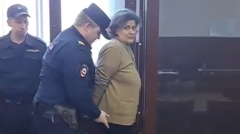A St. Petersburg hairdresser has been sentenced to five years in prison after being found guilty of disseminating "fake news" about the Russian military, a charge that has raised concerns over freedom of speech in the country. The case, linked to a personal feud with a neighbor, highlights the escalating crackdown on dissent amid the ongoing conflict in Ukraine.
St. Petersburg Hairdresser Sentenced to Over Five Years for "Fake News"

St. Petersburg Hairdresser Sentenced to Over Five Years for "Fake News"
Anna Alexandrova inherits a punitive legacy as dissent continues to be suppressed in Russia, following her conviction for anti-war posts stemming from a neighborhood dispute.
A hairdresser in St. Petersburg has received a prison sentence of five years and two months for purportedly spreading "fake news" about the Russian military, a controversial charge stemming from her alleged anti-war comments on social media. Anna Alexandrova has consistently denied any wrongdoing, claiming that her conviction is rooted in a personal dispute with her neighbor. Reports indicate that the neighbor, upset over Alexandrova allegedly sending images related to the Ukraine military conflict, lodged complaints with authorities that ultimately led to the hairdresser's arrest.
The laws punishable by substantial prison time were enacted in Russia shortly after the invasion of Ukraine in February 2022, marking a significant escalation of government tactics to suppress dissent. Since the beginning of the war, many voices critical of the Kremlin have been silenced, mirroring past repressions seen during the Soviet era.
In a separate yet equally troubling development, four journalists in Moscow have also been sentenced to five and a half years prison for affiliated work deemed as supporting an "extremist organization." These reporters maintained they were merely fulfilling their roles as journalists, yet their convictions reveal the stringent limits placed on press freedom in Russia.
One of the jailed journalists, Antonina Favorskaya, recorded the last known videos of the prominent opposition leader Alexei Navalny before his death in a penal colony the previous year. This chilling connection underscores the increasingly perilous environment faced by independent media in Russia.
The case against Alexandrova appeared to center around an initial ordinary conflict regarding land rights that escalated upon the introduction of the "fake news" charges. Her attorney remarked on the unexpected sway this law had over a neighborhood altercation, with allegations quickly evolving from personal grievances to legal battles over freedom of expression.
Alexandrova, a mother of two, was arrested in November 2023 for sharing content via anonymous Twitter accounts. Although she holds that she did not furnish her neighbor with wartime imagery, the court dismissed her claims and imposed stringent restrictions, including barring her from posting on social media for three years following her release.
Meanwhile, the lawyer of Alexei Gorinov, a Moscow council member originally jailed under the same "fake news" statute in July 2022, is pursuing legal challenges against the constitutionality of this repressive law. Gorinov’s sentence was exacerbated by comments he made criticizing the ongoing war during a council meeting. Advocates pensively argue that such legal tools are being misused to quash genuine voices of dissent and conceal truthful information that contradicts the official government narrative.


















